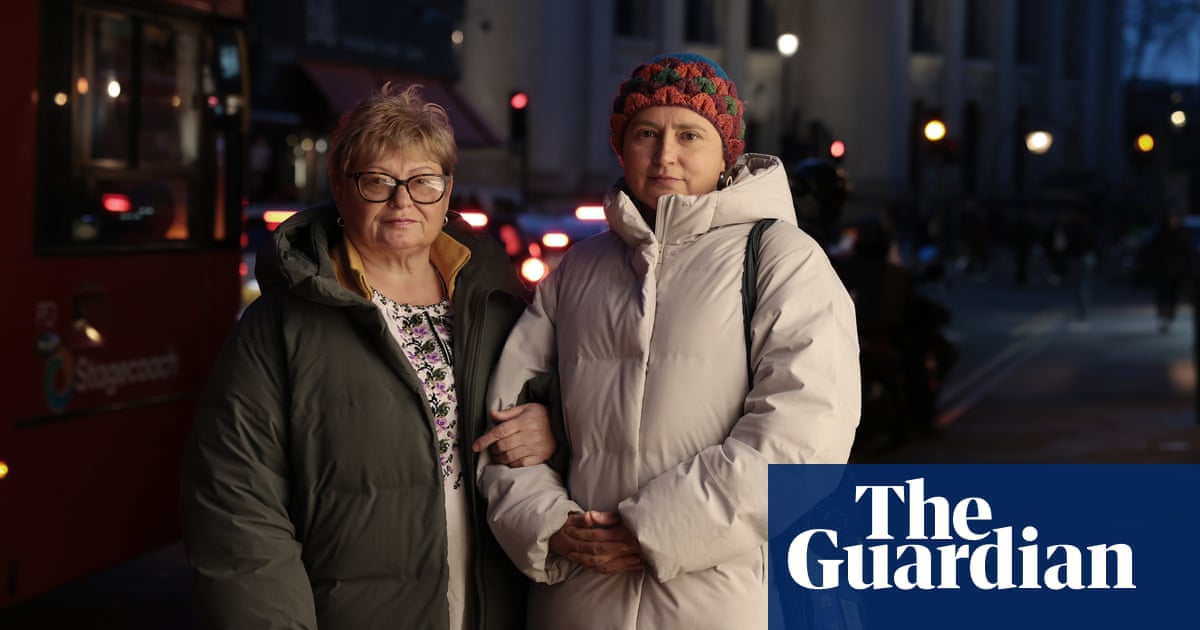When Alexandra McTeare was told she might have to wait three years for knee replacement surgery, she felt desperate. “Because of how miserable your life is, how small it has become,” she says.
The problems with her knee started in 2017. “It was painful and would swell up, particularly in the heat.” She would take painkillers and keep her leg elevated when she was sitting down, and did stretching exercises for her muscles. But over the next few years, “it gradually got worse, the intervals between swelling episodes reduced and the pain increased”. It reached a point where it was no longer bearable.
McTeare, 66, thought it was probably arthritis, which she already had in her hip, confirmed by an X-ray. But in September 2022, she finally called her GP, in Bridport, Dorset. She had a phone call with her GP, then a phone consultation with a physiotherapist, who decided (also over the phone) she had a torn meniscus – or knee cartilage – and gave her some exercises to do.
The following spring, in 2023, McTeare and her husband went on holiday to Italy. “Florence and Pisa. After the first day, my knee was really swollen and the pain was horrendous. A horrible pain,” she says. “Like a toothache in your knee.” She went to the pharmacy and got painkillers. “I was dosing myself up with them to get through the trip – I wasn’t going to just sit in the hotel room; we’d been wanting to go for years.”
When she got home, she sought help again. “I was backwards and forwards to the GP. I didn’t actually see the GP, it was always a nurse practitioner … they kept saying it was a torn meniscus and it will get better.”
Ten years ago, McTeare could get a GP appointment within a week. “Now, you phone up and you’re lucky if you get an appointment within a month, and nine times out of 10 it’ll be a nurse practitioner.” McTeare has nothing against nurse practitioners; she used to be a nurse herself (we will come to that later) and she was working for the NHS when they were introduced to GP practices. “But they’re not appropriate for everything,” she says. “People do need to be able to see a GP.”
Her knee didn’t get better. The opposite happened. “I didn’t believe it was a torn meniscus, it was going on and on, so I decided: to hell with it, I’ll pay and see somebody privately.” In March 2023, she saw an orthopaedic consultant, got an X-ray, was told she had arthritis in her knee and needed a total knee replacement. It took no more than half an hour and cost her £400. McTeare says she is lucky she could raise the money for a private consultation. But she wants to make something clear: “I have always despised private medicine.”
Before she retired, in 2014, McTeare had worked for the NHS for 30 years – as a district nurse, then managing district nursing teams, before becoming a health and social care commissioner for a London health authority. She did once do some agency nursing work in a private hospital, “when I was saving up to go travelling. I always said I would never go private; I thought the care in the NHS was far superior. At that time, it was.”
The consultant she went to see privately put her on a waiting list in April 2023 – his own waiting list – to have an NHS knee replacement at Dorset county hospital in Dorchester. He told her the wait was likely to be 18 months.
The waiting list in England for routine hospital treatments such as knee replacements is now 7.6m cases long – even after it fell last month. Labour’s deadline to eliminate waiting times of more than 65 weeks has been missed twice. In one of the party’s more ambitious election pledges, the health secretary, Wes Streeting, promised to clear the backlog of people waiting more than 18 weeks for routine hospital treatment within five years. There are 22,903 patients who have been waiting more than 65 weeks to start routine treatment.
A study in July by the Nuffield Trust found that waiting times for knee and hip replacements in England are higher than they were before the pandemic, attributing this to decades of underinvestment in NHS staff, beds and equipment, which is leaving it trailing behind other European countries. For knee replacements, the median waiting time in England is 142 days. In Italy, it is fewer than 50 days. Other countries, the report says, also have better community support, which allows patients to continue their recovery at home and unlock hospital beds.
In June 2023, two months into her time on the waiting list, McTeare’s hopes were raised when she was called in for a pre-operative assessment at Dorset county hospital. She had another X-ray, plus blood tests and blood pressure checks. “I thought: ‘Wow, fantastic, this must be happening.’” But after that, nothing happened. When she called the hospital to see how long her wait for surgery might be, they said: “Something like three years.”

After this call, McTeare’s mental health started to decline. Before her knee pain, she had been fit and active. She swam, she did yoga; most of all, she walked. Her favourite, a two-hour circular walk, follows the path that passes a few metres from her front door on the outskirts of Bridport. It goes steeply uphill, then turns south towards the sea, with spectacular views down Chesil Beach and over to Lyme Regis.
Walking is important to McTeare and her husband. It’s one of the reasons they left London and retired here. But she hasn’t done that walk, or indeed any big walk, for two years. She can’t look after her two young grandchildren; she misses her yoga class and the other women who do it. She misses walking. “My world now is really just in this house pretty much all the time. I couldn’t walk, I got depressed, I put on about two stone, then the more weight you put on the more depressed you get, you eat more chocolate because you feel so fed up, and so it goes on. There were times I thought: ‘What is the point in my life?’ And then I thought: you know, you’ve only got knee pain, pull yourself together.”
Dorset has a service to which you can refer yourself if you are feeling depressed. McTeare had five or six counselling sessions over the phone, which was helpful. “It was just good to be able to talk to somebody about how I was feeling,” she says. “You don’t really want to bore your loved ones with all of it, like a broken record. I think it was just good to be able to offload to somebody neutral.”
Meanwhile, the pain continued relentlessly. “It’s bone on bone; there’s nothing to cushion the two bones.”
In November 2023, Dorset county hospital invited her to attend its joint school. There were about 50 other people at the session, mostly older than McTeare, all waiting for knee and hip replacements. “They give you tea and biscuits and talk you through what the operation is going to be like, tell you what exercises you should be doing, encouraging you to lose weight,” she says. “I did actually lose 10 pounds after coming back from that, because I thought: ‘I really do need to lose some weight before the operation.’ But there was no operation, or hope of an operation.” The hospital, when she called them, told her the wait could still be three years.
Around the same time as the invitation to joint school, McTeare found out that another volunteer at the arts centre where she helps out had had his knee done on the NHS, but at a private hospital in Shepton Mallet, Somerset. He said that she should get her GP (the same as his; he also lives in Bridport) to refer her there.
So that is what she did. The Somerset orthopaedic assessment service got back to her by December. But they “hummed and hawed about whether they were going to see me” for about six weeks. Then, in January, “they said no”. The reason given was that she lives in Dorset. “So I said: ‘What about my friend?’ But they wouldn’t have it.” A spokesperson from Somerset NHS foundation trust said they could not comment on McTeare’s case, as she is a Dorset patient.
A couple of things happened next. Another friend, in Bournemouth, got a date for knee-replacement surgery three months after his first appointment. The operation would be done on the NHS, but at a private hospital in Poole (which is in Dorset). So McTeare asked her GP to refer her there.
She also saw a TV programme about people going to Lithuania to have hip and knee replacements. She did what anyone else would do: Googled it and found a Facebook group for the hospital mentioned on the programme. “A couple of people had had little problems afterwards and were asking questions, but I’d say it was about 95% really positive.”
She costed it up: with the operation, aftercare, flights and accommodation, she could fix her knee for about £8,000. A lot of money, but considerably less than the £14,000 it would cost her privately in the UK. She talked with her husband. “We decided we’d use some of our savings, to kind of get our life back.” It wasn’t an easy decision. “I’m passionate about the NHS; the thought of going private anywhere goes completely against everything I believe in. But I’m in horrible pain and my life is shit. What else am I going to do?”
McTeare was getting ready to go to Lithuania when, on 9 February 2024, she got a letter from the NHS confirming an assessment appointment at the Harbour private hospital in Poole, on 22 February. She could have the operation there, it said, on the NHS.
In 2023, private operators carried out 1.7m NHS procedures – 10% of all planned operations. Critics say these firms are making “a killing” out of the NHS, but NHS England says it’s the best way to clear the huge backlog.
Finally, in February 2024, two years after her first GP visit, McTeare checked in to the Harbour hospital in Poole (“very nice, lovely food”) and got a new Teflon knee on the NHS. She shows me the scar, which is surprisingly small, considering what a total knee replacement involves. “They slice you down here,” she says, tracing along the scar. “And then they take your patella out, and then they cut off the bottom of your femur here and put a new joint in, effectively.” Then the knee cap goes back. “They hammer it in, basically. You have an epidural and a strong local anaesthetic, but I woke up when they were hammering. I said to the anaesthetist: ‘I can hear that and I don’t want to.’ She said: ‘Don’t worry,’ and gave me some ketamine.”

McTeare blames the challenges the NHS is facing firmly on “the bloody Tories” and austerity. “So much money was taken out. From 2010 to when I left in 2014, working as a health commissioner in Lambeth, we were just clawing back everything; it was awful. And that clawing back has gone on since. I can’t imagine what it’s like now.”
But it’s not just about the underfunding, she says. McTeare heard that she might be able to get her NHS operation done at a private hospital not from her GP or any of the other health professionals she saw, but from a friend, completely by chance. If she hadn’t had that conversation, she would probably still be waiting. “Because of what my work was, I know my way around the system. I’ll get on the internet, look things up, but even I found it impossible. God forbid you’re in this situation and, say, you didn’t speak English. I don’t think you’d stand a chance.”
McTeare’s GP surgery said in a statement: “We understand that navigating referrals and hospital options can be challenging,” adding that: “The complexities of NHS and private healthcare systems occasionally create frustrations.” It said that McTeare’s experience “reflects broader challenges within the NHS, such as capacity pressures and variability in regional service availability”, but that it strived to “improve coordination and communication”.
Two weeks after her operation, McTeare got a phone call from Dorset county hospital. “I said: ‘Are you ringing to tell me you’ve got a date for my operation? I had it at the Harbour, I thought you would have known.’ And they said: ‘Oh no, we were ringing to ask you to come in for your pre-op assessment because the one you had is now out of date.’”
It had been a year since the last one, which is how long they last. “They must be doing this the whole time, multiple assessments. Think of the cost: the blood tests and X-rays – it’s nuts. Who would dream up a system like that?”
A spokesperson for Dorset county hospital NHS foundation trust apologised for “any confusion” over McTeare’s route to surgery – adding that ensuring patients are as fit as possible before their surgery leads to better outcomes. “We continuously review all the available capacity with local providers, including the use of the independent sector, to provide surgery as soon as possible … We’ll look at what more we can do to ensure the communication around this is as clear as possible.”
McTeare’s knee is still painful, but it’s more bearable. She can walk, with a stick, but not very far. When I check in with her again a few weeks after my visit, she has managed to walk into town for the first time. She is not quite ready for that spectacular walk looking over the Jurassic Coast. But it’s no longer an impossible dream – it’s a goal.

 2 months ago
45
2 months ago
45













































